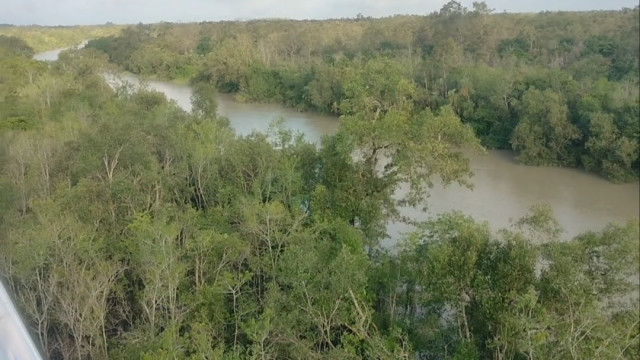Mongla, Apr 16 (V7N)– A sense of unease is creeping back into the world's largest mangrove forest, the Sundarbans, as incidents of banditry appear to be on the rise again. Following a period of relative calm after numerous bandit groups surrendered in recent years, the resurgence of these criminal elements is instilling fear among those who depend on the forest for their livelihoods, particularly fishermen who are now hesitant to venture into its depths.
"The fear of bandits has increased again in the world's largest mangrove forest, the Sundarbans... But the bandits have started to rear their heads again. Due to this, the fear of the Sundarbans is embodied in the banditry, and the fishermen are afraid to go into the forest because of the banditry," reported Abu Hossain Suman from Mongla.
While the Bangladesh Coast Guard continues its patrolling operations, which has helped to mitigate some bandit activity and brought relief to coastal forest dwellers, the recent spate of kidnappings raises serious concerns.
"However, the Coast Guard's patrolling operation is continuing. This has reduced the activity of the banditry. Relief has returned to the forest dwellers on the coast," Suman noted.
Sources within the Forest Department and law enforcement agencies highlight the significant progress made in previous years, with multiple rounds of surrenders by bandit groups. In 2016, seven groups comprising 32 bandits laid down their arms. This was followed by the surrender of 57 bandits from nine groups in November 2018, and another 25 bandits in November 2019. These surrenders, involving over a hundred individuals, had moved the Sundarbans closer to becoming bandit-free.
"Sources from the Forest Department and law enforcement agencies say that the bandits in the Sundarbans surrendered in several rounds and returned to the path of light... More than a hundred bandits surrendered and returned to normal life, due to which the Sundarbans moved towards becoming bandit-free," the report detailed.
However, recent events, including the kidnapping of 'Bawalis' (traditional woodcutters and honey collectors) over the past three months, strongly suggest the re-emergence of new bandit factions within the Sundarbans.
"However, incidents such as the kidnapping of Bawalis in the past three months once again indicate the emergence of a new bandit army in the Sundarbans," Suman reported.
According to sources, at least 20 fishermen and foresters have been abducted in various parts of the Sundarbans in the last three months, with ransom demands ranging from Tk 10,000 to Tk 300,000. In several instances, successful operations by the Coast Guard have led to the rescue of the kidnapped individuals.
"Sources say that in the last three months, at least 20 fishermen and fishermen have been kidnapped in different areas of the Sundarbans. Ransom ranging from Tk 10,000 to Tk 3 lakh has been demanded from them. In several cases, the Coast Guard has been able to rescue the fishermen through successful operations," the report confirmed.
Speaking on condition of anonymity, several fishermen and foresters associated with the Sundarbans revealed the formation of new forest bandit groups operating under different names, including the Karim Sharif Bahini and Dayal Bahini, among at least 5-7 such groups. These bandits reportedly operate from boats deep within the Sundarbans, maintaining camps at various strategic points. They exploit opportunities to take fishing trawlers or foresters hostage, transporting them to their camps where they face mental torture until ransoms are paid.
"Several fishermen and foresters associated with the Sundarbans, on condition of anonymity, say that new forest bandit groups have been formed under different names. Among them, there are at least 5-7 robber groups including Karim Sharif Bahini and Dayal Bahini. These forest bandits stay deep in the Sundarbans by boat. They have camps at different points in the forest. Taking advantage of the opportunity, these forest bandits sometimes take fishing trawlers or foresters hostage. After kidnapping, they are taken to the forest bandit group's camp and subjected to mental torture. Many have been released from there by paying ransom," Suman elaborated.
A fisherman from Chairman Mor in Rampal Upazila, Bagerhat, who wished to remain anonymous, identified the Dayal Bahini as particularly brutal among the active bandit groups. He stated that this group divides into smaller units to attack fishing trawlers and kidnap individuals, known for their ruthless torture tactics if ransoms are not paid, and their willingness to kill and dispose of victims in the river.
"A fisherman from Chairman Mor, Rampal Upazila, Bagerhat, who did not want to be named, said, 'Among the many bandit groups active in the Sundarbans at the moment, the Dayal Bahini is the most brutal... They are so notorious that they brutally torture people if they do not pay the ransom. They do not hesitate to kill someone and throw them into the river,'" the report detailed.
Lion Dr. Sheikh Faridul Islam, Chairman of the Save the Sundarbans Foundation and Joint Convener of the Bagerhat District BNP, suggested that forest robbers often infiltrate the Sundarbans disguised as foresters or fishermen. He emphasized the need for a digitized database of these criminals for easy identification and called for measures to prevent their entry into the forest. Additionally, he recommended increased intelligence surveillance, monitoring of the bandits' families, heightened law enforcement patrols, and the provision of alternative employment opportunities for former and potential bandits. Dr. Islam warned that the resurgence of banditry poses not only a security threat to the Sundarbans but also an economic and environmental crisis that requires urgent action to protect the natural resource and the communities dependent on it.
"Save the Sundarbans Foundation Chairman and Bogerhat District BNP Joint Convener Lion Dr. Sheikh Faridul Islam said, forest robbers usually enter the Sundarbans disguised as foresters or fishermen and engage in banditry... If urgent action is not taken, the future of this natural resource and the people dependent on it will become more uncertain," Dr. Islam stated.
In a recent success for law enforcement, the Coast Guard rescued 33 fishermen, including six women, on April 10th, who had been held hostage by the Karim Sharif's forces deep within the Sundarbans. The Coast Guard had also previously arrested several bandits and seized weapons.
"Meanwhile, on April 10, the Coast Guard rescued 33 fishermen, including 6 women, from the depths of the Sundarbans, held hostage by bandit Karim Sharif's forces. Earlier, the Coast Guard had also arrested several bandits along with weapons," Suman reported.
Lt. Mahbub Hossain, media officer of the Coast Guard West Zone Headquarters, reaffirmed the Coast Guard's commitment to combating piracy and banditry in the Sundarbans, stating that their active operations will continue in the future.
"Lt. Mahbub Hossain, media officer of the Coast Guard West Zone Headquarters, said, 'Just as the Coast Guard was active in suppressing piracy in the Sundarbans in the past, it is still active today, and this activity will continue in the future as well,'" Lt. Hossain assured.
Despite the Coast Guard's efforts, the resurgence of bandit activity underscores the persistent challenges in maintaining security within the vast and complex ecosystem of the Sundarbans, threatening the safety and livelihoods of those who rely on it.
END/AHS/RH/






























Comment: